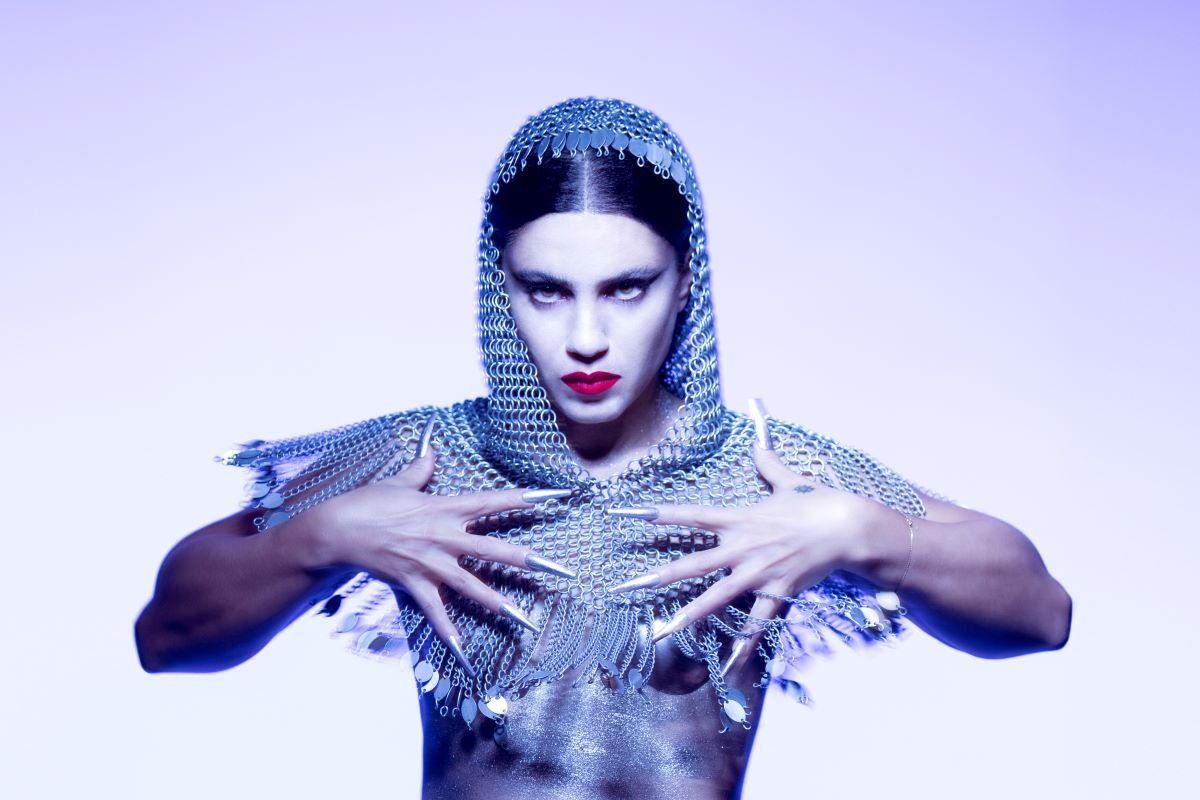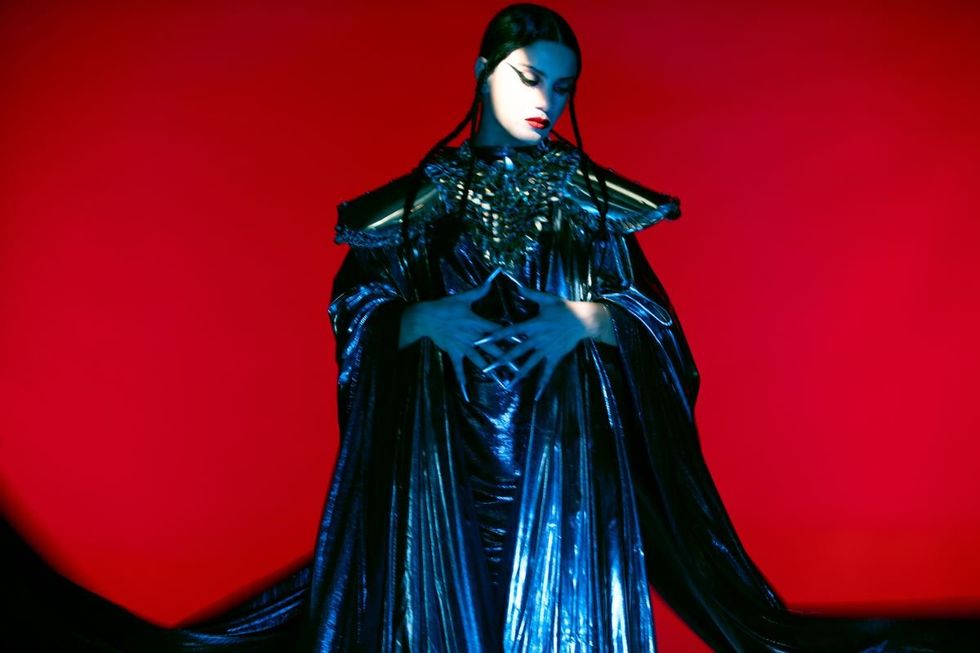EMEL Summons Action and Resistance on Fifth Studio Album ‘MRA’
Tunisian singer EMEL continues her musical exploration, as well as her fight for freedom through an explicitly feminist lens on MRA.

Tunisian singer-songwriter and musician Emel Mathlouthi aka EMEL.
EMEL begins her new album MRA (Arabic for woman) with an assertion and a promise: “It’s the voice that is growing inside you and me / It’s the new way you draw on the day you are free / It’s the fire that is burning inside you and me / It’s the soul that is born on the dawn you are free.”
The first track, “Massive Will,” opens MRA with a battle chant, cinematic and all-encompassing; EMEL doesn’t give us time to warm up. She demands we listen now, to this album made only by women and queer collaborators, to this journey exploring what it means to seek freedom collectively, across continents, languages, and genres.“Even though I've been living in three countries, I feel like there are so many ways — especially for women of color — of not being free,” EMEL says in a phone call with OkayAfrica. She is running between appointments in Paris where she is promoting MRA, but sits down in a quiet spot and reflects on the motivations behind the project.
“Whether it’s the family prison, society’s prison, or in my specific case, being an Arab artist in the West, I feel like I'm always stripped of the many layers that make me who I am,” she shares. “I want to be free to define myself the way I want, to do the music I want, and to represent myself in a way that suits me, not the system or the way Western media perceives me.”
“My voice has no limits /
My voice knows no end /
My voice is my existence”
EMEL recounts her journey towards freedom and the different meanings the word has taken on across time. “The first step was to leave my parents house and become a musician. The second step was to leave the dictatorship in Tunisia,” she says. “But the struggle for freedom is still there because I'm still not free to perform in Tunisia, and there are always family rules and ways people expect you to be. As an Arab and African woman, there are so many ways society expects you to be something that you don’t want to.”
In defiance of these expectations, EMEL rose to fame as a musician of protest music, gaining the reputation of being an artist who challenges and experiments. “I just want to break all the rules,” she says. A blend of African trap, batucada, Arabic reggaeton, hip-hop, and drum n’ bass, with lyrics sung in five different languages and three dialects, MRA does exactly that.
“For this album I wanted to go mainstream with an edge,” says EMEL about the ethereal hip-hop and indie-pop sounds that we hear on MRA. Her epic, grandiose signature doesn’t really fit the description of mainstream, but she says that she calmed down a little on this album.“I’m quite crazy when it comes to working on an album and creating something new. I’ll try to make music with literally anything, a drum or a Christmas Tree.”
The intention to create an all female production stems from the realization that she had never worked with women on any of her albums, especially not in production and arrangement. When she went out to find female producers, they were hard to come by; but when she discovered them, she paradoxically realized that they are everywhere, just vastly underrepresented.
Finally with an impressive team from Algeria, Nigeria, the U.K., Brazil, France, Iraq, Iran, and Ukraine, EMEL set out to craft a call to action, and pay tribute to those who are suffering under the unfair systems she has sung against throughout her career.

EMEL became the voice of the Arab spring in Tunisia with her song “Kelmti Horra” and performed at the Nobel Peace Prize in 2015.
Photo by Amber Grey.
On “Mazel” (Still here), she sings “I still have a hope / I still have dreams / To build a new path / I will never give up / I will create a new world.” A collaboration with French singer Camélia Jordana, the track tells the story of a transgender girl who was sexually abused.
“This person reached out and confided in me,” says EMEL. “Her words were like poetry, and even though it was extremely shocking, I wanted to showcase her powerful will to not be a victim, but instead to own her life, future, and destiny.”
EMEL feels that this person’s words resonate not only through this track, but throughout the whole album which she considers a sonic resistance to draw strength from. “[Mazel] was kind of a mirror, even though I was mainly paying tribute to her and all victims of violence, visible and invisible.”
“I am a soldier /
I am a fighter /
I am a bullet”
For International Women’s Day, EMEL released “NAR” (Arabic for fire), the second track of the album. She collaborated with Malian rapper Ami Yerewolo, a pioneering musician in her own right. In 2014, Yerewolo released the first female Malian rap album Naissance (Birth). The music video is set at an old, women-operated textile factory in Cairo, Egypt and a village in the outskirts of Bamako, Mali.
“I was really excited about ‘NAR’,” says EMEL. “We’re connecting more dots on the continent and rewriting our narrative as Arab and African women. It’s not something that the world sees often. I wanted to share a different image: We're not just one color or identity, we’re multiple, and at the same time we can connect so much. Because of colonization, we’ve lost connections with each other, so I am trying to rebuild that.”
EMEL feat Nayomi - Lose My Mind (Official Music Video)
While “NAR” sets the album on fire right in the beginning, track eight, “I’ll Leave,” shows a different side to the struggle. EMEL gets vulnerable, singing “Father father help me think this through / I can’t seem to possibly find the truth / The world you drew for me has lost its way / And I can’t be the one to bring it back / I’ll leave.”
“It started off as a love song,” she says. “I had two chords. When I write melodies and music I’m usually minimalist. I wrote ‘I’ll leave,’ because sometimes it’s so hard to fight all the time; it gets too exhausting and I just want to sit back. The song turned out to be describing what’s happening right now: we’re witnessing people’s suffering and the world is going mad.”
She recovers, however, and returns to power on “Rise,” singing “I will rise again / Like a phoenix / I will not surrender.” For EMEL, releasing MRA is just the beginning of an artistic exploration of her region, her continent, and beyond.
“This is the first time I'm this open to anything coming out of the region,” she says. “My taste is more flexible, I'm enjoying things that are different to what I do. I feel like I almost have a responsibility, because growing up in Tunisia, we really had mixed identities, listening to Sheikh Imam and Pink Floyd and Celine Dion. So for this album, we explored a bunch of eclectic things, like trance folklore, ‘70s Algerian rai, or a very specific popular Tunisian music called Nuba.”
As part of releasing MRA into the world, EMEL hopes to collaborate with local musicians, perform in more places, and rally women across the globe to claim their narratives, voices, and futures, together.
Stream MRAhere.
- Interview: Award-Winning Eswatini Artist Mzwaa is Shifting The Paradigm ›
- Stella Mwangi: Hip-Hop Saved My Life as an African Growing Up in Norway ›
- Prêt-À-Poundo Interview: Cyrus Kabiru ›

